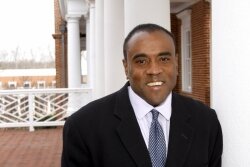Social capitalist: Fairchild's unlikely B-school path
Greg Fairchild has to cancel a phone interview. He's in Macedonia and has been invited to the president's house to listen to jazz after they discovered a mutual interest in Chet Baker earlier that day at lunch.
This sort of thing seems to happen to Fairchild a lot.
Darden professor Fairchild has accumulated a stack of accolades. Last year, CNN/Fortune named him one of the top 10 business school professors– in the world. He's the only academic on Virginia Business Magazine's top 25 Virginians to watch in 2011. And let's not forget his three-year, $850,000 MacArthur genius award.
"I haven't lobbied for any of these," demurs Fairchild. "I'm just flattered. I teach at a business school and am interested in people who don't have a lot of money and businesses that aren't very big."
He acknowledges that's a field that defies the stereotype of B-schools instructing MBAs on how to take a Silicon Valley start-up and grow it to an IPO, or take a large corporation and out-compete another large corporation.
Fairchild isn't from an inner city or low-income background, he says. But he was always interested in the question of business development, going back to his days as a Darden MBA student in the early '90s, when he went to Moscow and wrote a case study on the opening of Pizza Hut, at that time a very risky venture. Fairchild discovered he liked risky ventures, particularly ones that could improve people's lives.
While working on his PhD. in philosophy at Columbia in the late '90s, Fairchild ended up in the midst of the transformation of Harlem, when lots of people and businesses were moving in. A paper called "The Competitive Advantage of the Inner City" by Harvard professor Michael Porter had a profound effect on him.
"I thought, what if I built my career around that?" says Fairchild, who admits that seeing a hotshot professor write about such a topic gave him some comfort.
Fairchild, says Darden Dean Bob Bruner, "builds critical thinking about moral dilemmas in management. He brings an important interest in grassroots entrepreneurship as an engine of revitalization of economically depressed areas," such as Southside and southwest Virginia.
And it was Bruner who sought Fairchild out when the dean got a letter from a prisoner in Buckingham asking if there was anything at Darden for him.
Fairchild was afraid that the answer might be no. "Darden serves a high-income market that can afford a $100,000 degree," he points out.
Instead, one Fairchild connection led to another and he began teaching inmates– 30 sessions on small business entrepreneurship using Darden's case studies and the Socratic method. Last spring he had 14 inmates at the Dillwyn Correctional Center graduate with certificates of completion from UVA. "I felt that would help them when they got out of prison to give to an employer," says Fairchild.
This year, the state has asked him to expand the program to the Fluvanna Correctional Center for Women.
And the whiz professor has learned something about incarcerated students. "You cannot underestimate how prepared someone is when going to class is their privilege of the week," says Fairchild. "They come very, very prepared."
Fairchild discusses prison entrepreneurship at the Tom Tom Founders Festival April 14 at 3pm at the Haven.
